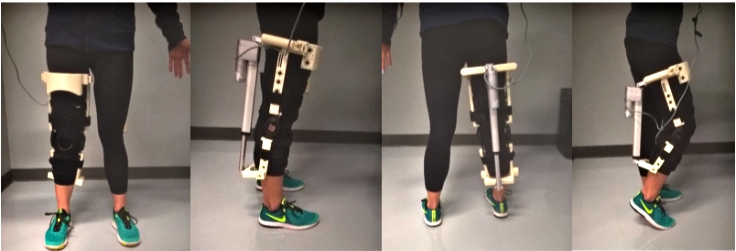
DENTON, Texas (UNT) — A University of North Texas graduate student is taking a step towards making exoskeletons available to help more people.
Typically exoskeletons, which are wearable mobile machines that allow for more limb movement, increased strength and endurance, are extremely expensive and mostly used in the military world. However, Jenn Cao, a student in UNT’s College of Engineering, has created a working prototype aimed at helping those who struggle to walk because of osteoarthritis in their knees.
“We built a prototype and it functions,” said Cao. “I’ve tried it out myself and it really works. It’s very new, but we now have created a brace that could potentially increase range of motion.”
While Cao is currently studying mechanical engineering, she has an undergraduate degree in biomedical engineering and found a mentor and inspiration in Vijay Vaidyanathan, the founding chair of UNT’s biomedical engineering program.
“Dr. Vaidyanathan’s father is elderly and has trouble walking,” said Cao. “That was the inspiration behind this exoskeleton idea. There currently isn’t one made for the elderly, so, we wanted to create one that was relatively cheap for production and increases the knee range of motion. We’re hoping to help with knee weakness, pain and knees that just don’t want to bend.”
According to Cao this device could have an even bigger future.
“This is potentially a big picture idea that could work for anyone who could use functional knee help on a day-to-day basis,” she said. “We’re still in the process of digging deeper to see how we could model something like this into a more concrete form. However, I am excited about what could happen next.”
What happens next for Cao is graduation. The exoskeleton prototype is part of her thesis, which she is defending this month. She is then set to receive her master’s degree in May. While many in her position would right now be worried about finding work, Cao isn’t. On top of going to school full-time, she also works full-time at Abbott Laboratories in Plano.
“I’m really happy where I am,” said Cao. “I’m working as a mechanical engineer in medical devices. It’s a dream job!”
While it may have been her dream job, Cao didn’t immediately accept it. It took a talk with her mentor to convince her she could really do it all.
“They called me last spring and I first told them I couldn’t because I was a full-time student,” said Cao. “However, Dr. Vaidyanathan had great advice for me. He told me that I’m getting my degree to work, and that this was an amazing opportunity. He also told me he knew it would be exhausting, but I could do it. So, I’m taking it one cup of coffee at a time. I’m doing it all because I am passionate and I love this work.”




